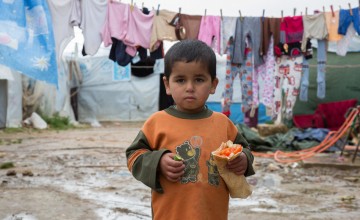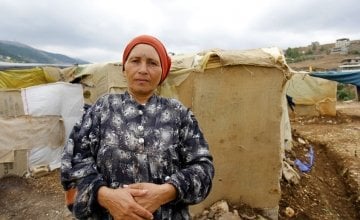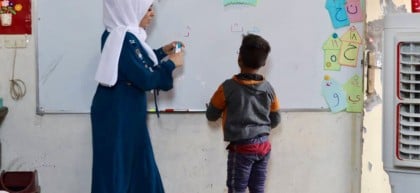
Read our 2022 annual report

Knowledge Hub
Sustainable solutions, not just band-aids of rescue and resettlement

Concern CEO Dominic MacSorley writes about the importance of addressing the root causes of the refugee crisis in the Mediterranean with sustainable political solutions.
Staggering problem
Today’s humanitarian emergencies are beyond anything we have experienced in living history. Conflict and global terrorism have propelled the number of refugees and displaced people in the world to over 60 million.
These numbers are staggering.
Yet, the world has changed since the 1950s, when current refugee laws emerged to deal with the massive population movements across Europe as a result of World War II.
If we needed any more evidence of how we have collectively failed to implement sufficient legal protection for those fleeing conflict and destitution, then the recent tragedies in the Mediterranean Sea provide exactly that. The International Organization for Migration (IOM) has stated that nearly 1,000 migrants drowned in less than 10 days in April alone. These deadly episodes have become a frequent occurrence, and it is to our shame that they are entirely preventable.
Moral responsibility
We have a moral responsibility to act immediately to avert further loss of life by creating credible, safe and legal avenues to enable desperate people to find refuge and sanctuary, while improving and expanding search and rescue operations.
But here’s the hard part: as important as it is to find a comprehensive approach to managing migration, this is ultimately a Band-Aid solution to a much larger problem.
Just look at where the majority of the migrants are coming from: sub-Saharan Africa, Somalia, Eritrea, Mali and Syria – all countries experiencing acute levels of conflict, persecution and poverty.
The factors pushing people to gamble their lives on a sea-crossing to Italy are still in place. Their journeys, though taken in the 21st century, resonate with one of the terrible chapters of our own history: the coffin ships.
So we can’t afford to waste more time. We need to tackle the root causes of this tragedy.

Syrian crisis
Incredibly, Syria alone accounts for more than one fifth of the people homeless and on the move in our world today, including some 7.6 million displaced within its borders and almost 4 million living as refugees outside.
These are people who have been bombed out of their homes, persecuted, denied food, water, and access to health facilities. They’ve seen their families ripped apart, their communities destroyed. As one refugee woman described it to our staff, it was “like falling from heaven to hell”.
The vast majority of these courageous people who have already survived so much devastation are to be found living a perilous existence as refugees amid swollen host communities in the neighbouring countries of Lebanon, Turkey and Jordan.
I was back in Lebanon, earlier this summer, a country an eighth the size of Ireland that has provided a safe haven for 1.2 million Syrian refugees, an extraordinarily generous commitment that is increasingly strained given the massive pressure this is having on the local economy and on overstretched health and education services.
Abysmal failure
Now entering its fifth year, Syria has come to symbolise our collective failure to provide adequate protection to civilians caught in conflict.
Asylum, resettlement, and the need for continued funding to support host countries are all critical.
But, ultimately, the single most important issue is the abysmal failure of the United Nations Security Council to reach a political solution to end Syria's civil war.
Just take as an example the three Security Council resolutions on humanitarian access and protection of civilians in Syria. They are bold, clear commitments to ending the suffering of the Syrian population. But without the political and financial back-up from individual member states, they remain little more than words on a page.
Political solution
It is now time for powerful and influential governments to put aside narrow self-interests and take concrete steps to significantly scale up humanitarian assistance to meet people's immediate needs and push the warring parties towards a political solution.
And this needs to happen now. We can move fast when we need to. The European Union met immediately for crisis talks the day after so many lives were lost at sea in April and developed a ten-point plan. The same speed and resolve needs to be brought to bear to end the suffering of Syrian civilians and reopen stalemated peace talks to end the bloody conflict.
We can’t afford to succumb to hopelessness or throw our hands up in the air. Ending the desperation and suffering for millions of Syrians is the moral challenge of our time.
Last year, almost 3,500 migrants drowned in the Mediterranean, many of them children. This week we reached a grim milestone: 2,000 people have died this year to date.
If we don’t act soon, decisively and daringly on securing sustainable solutions, we are not going to be able to escape blame the next time a migrant ship sinks, taking countless human lives and dreams with it.
In depth


